The Ragwitch Read online
Page 14
He paused to wipe his eyes, his hands shaking with the effort. Without thinking, she got out her handkerchief, and wiped the mud from his eyes. He looked at her as she cleaned off the mud, but his eyes were far away.
“My thanks,” he said. “My body seems weaker than my mind. For now that I remember, it was the Citadel at Yendre I last saw, with the great gate borne down by the Stone Knights, and the red flicker of Gwarulch eyes in the moonlight. My guards…my friends…fell about my feet as we were driven down into the very cellars of the keep. My sword shattered on an Angarling back, and then She was standing above me…with Gwarulch pinning me to the floor. I begged Her to slay me, but there was nothing human left in that beautiful shell…She just looked, and said nothing. Then there was a strange room, of air like water, and a globe of white light…a prison cell, where She spoke to me and showed the wasteland that was once my Kingdom. And then…the cold and darkness, and vague unformed memories—for a long, long time. And now at last, I have woken, though it be in some desert wasteland.”
“The white globe…” whispered Julia. “Then you’re not a memory either…”
“A memory?” asked the man, trying to smile. “What do you mean?”
“This isn’t a desert,” began Julia slowly. “It’s worse than that…”
“Worse?” asked the man, managing a brief smile. “It could be no worse than the prison of the white globe.”
“But it’s the same!” cried Julia. “We’re in Her memory—this is just a memory of a place, and the place with the white globe is just another part of Her horrible mind!”
As soon as she’d said it, Julia wished she’d told him in a nicer way. He seemed even weaker, leaning against the side of the gully, his breath coming in long, wheezing gasps—but he seemed to understand. When he finally spoke, he talked into the side of the gully, and didn’t look at Julia.
“You called Her the Ragwitch…and said She was the same North-Queen, that She had come back. Where did She come back from? How was She made to go? And what has happened to the Kingdom?”
“I’m not really sure,” said Julia. “I’m not from your Kingdom…but I know that when She was the North-Queen she beat everyone, and ruled the Kingdom, destroying it with Her creatures and Magic—these dried-up lands must be a memory from that time. But then the Magi and the Wild Magic attacked Her, and everyone thought that was the end of the North-Queen. But She wasn’t dead—just trapped in a different world—and She had to make herself a new body, so she became the Ragwitch. And for hundreds of years the Kingdom was all right, till…till She managed to get back. And now She wants to destroy everything!”
Julia trembled a bit on the last few words, but the man didn’t seem to notice. He didn’t look at her, for his eyes were full of tears, and he whispered, “I am King Mirran, and it was I who let a young Witch cast the spells that took her to the Nameless Realm, and the lure of evil. And it was I who could have stopped her in the early days of her power, when the Angarling made their slow way up from the sea. And still, there is no end…no end.”
He paused and took a ragged breath before turning to Julia.
“Now, tell me—what is your part in this?”
Julia trembled at the idea of telling this King that she was the one who’d helped the Ragwitch return, and for a second she almost ran away. But he looked so grim and terrible and sad that she slowly knelt down in the mud, and he sat beside her and listened: about how she found the Ragwitch, and what had followed after, at the Spire, and Bevallan and the Namyr Gorge.
“You have been led to help a great force of evil,” said Mirran, when she had finished. “But unwittingly so. I have done far greater wrong, with greater knowledge. You should not be ashamed.”
Julia bit her lip a little, and nodded, afraid that she would burst into tears if she said anything. She still felt awful for freeing the Ragwitch, but it wasn’t as if she’d done it on purpose, and it didn’t compare with King Mirran, who had suffered for so long. She briefly wondered why he hadn’t stopped the Witch all those years ago. She thought he was probably wondering too, sitting in the mud and brooding.
“Come on,” said Julia. “There is still hope. We can fight Her by doing what Lyssa said—go to Her memory of the sea.”
“And what then?”
“Then,” she answered, “we find Anhyvar.”
“Anhyvar!” exclaimed Mirran, staggering to his feet. “Anhyvar! Don’t you know who she is?”
“No,” said Julia, surprised at his reaction. “Lyssa said she is a memory of the Ragwitch we have to find. A woman with long red hair, who wears a silver star…”
“Anhyvar,” interrupted Mirran bleakly, “is the Witch who became the North-Queen. Lyssa has sent you to find the Ragwitch’s memory of Her former human self.”
It was quiet under the water after the noise and tumult of the battle at Donbreye. Only the swish of bubbles as they moved disturbed the tranquility of the water. High above, a yellow-green glow marked the surface, quite different from the dim green light where Paul, Quigin, Sevaun and Leasel walked on the bottom of the sea.
Almost as soon as they’d all arrived on the seabed (Paul upside down and struggling), Sevaun had led them south at a brisk pace. At first she had been in danger of leaving them behind, as the boys and the hare floundered along, trying to walk normally. But they soon learned to half-swim, just using their feet to push off from the bottom every few meters—except Leasel, who gave up and was now being carried in the front of Quigin’s shirt.
Paul was still the slowest, because he couldn’t really believe he was under the sea and still breathing. It was like a dream, but far more solid—in fact, too real, and after the first few minutes of worrying about drowning, Paul forgot about the strangeness in his efforts to keep up with the others.
Their half-swimming, half-walking progress was a lot of fun in the beginning, but after an hour or so, Paul was very tired. And the underwater world wasn’t half as interesting as the films he’d seen of tropical reefs and brightly colored fish. It was all green and weedy instead, and he’d only seen a couple of very drab fish—probably Trazel.
“Can we stop for a while?” he asked Sevaun. Surprisingly, the words were quite clear, and no bubbles came out of his mouth. All part of the spell, thought Paul, whose opinion of Sevaun was rather higher than his regard for most girls, partly because he was a bit frightened of anyone who could do real Magic…
Sevaun looked back as he spoke, and said, “I suppose so. But we should try and get a long way south, like…like Father said.”
Paul nodded, thinking back to Deamus and the fisherfolk…and the Gwarulch. He hoped they would all get away, but deep down, he knew that maybe none of them would escape, and even if they did, Donbreye would never again be the same quiet fishing village. Sevaun was obviously thinking about them too; seeing her red eyes, Paul thought that she was probably crying, though the tears just mixed with water, and were washed away by the sea.
“They’ll be all right,” he said clumsily, wishing Julia were there to look after Sevaun as well as him. “We’ll meet up…”
“Sevaun,” interrupted Quigin, pointing over her shoulder. “Do you know what those things are?”
Both Paul and Sevaun leapt around at once, creating a swirl of bubbles that made it impossible to see anything. Then, as the bubbles cleared, they saw three dark, finned shapes hurtling through the water towards them.
“Sharks!” cried Paul, fearfully, but Sevaun laughed and stepped forward, saying, “They’re dolphins, silly! Dolphins are friendly!”
“Dolphins!” exclaimed Quigin. “I’ve read about dolphins. But I haven’t got up to underwater animals yet. How do you say hello in dolphin?”
Quigin found out almost immediately, as the dolphins arrived, turned in a foaming circle around the children, and back-arched through the water, their bottle-noses split with cheery smiles. Paul smiled too, mostly with relief that they weren’t sharks.
After the first excited meeting
was over, the dolphins seemed eager to make Paul and his friends do something. Eventually, with quite a bit of gentle prodding from the dolphins, Quigin said, “I think they want us to hang onto them. Perhaps they’re going to take us south.”
“Maybe,” said Sevaun. “Dolphins are the special servants of the Water Lord. Perhaps he sent them to help us. After all, it is the Festival Day.”
“The Water Lord,” whispered Paul, and then more loudly, “I need to see the Water Lord. I hope they take us to him.”
“I don’t,” said Sevaun. “The Water Lord can be very nasty in person. Even Waterwitches don’t go and see him…”
“But I have to,” said Paul, trying to convince himself that he did. “I have to,” he said again, going over to the nearest dolphin. Gripping it tightly around the fin, his cheek pressed against the smooth grey skin, he whispered, “Take me to the Water Lord, please, Dolphin.”
The dolphin rolled its clever, kind eyes back towards Paul, clapped its long mouth together a couple of times, and took off.
Quigin looked after the departing dolphin, tucked Leasel in, held onto his own dolphin, and was following within seconds. Sevaun hesitated, looking back towards the land, her small face set in a frown that was holding back tears. Then she climbed astride the last dolphin, hung onto the fin like a saddlebow, and was away after the others. Away from the shallow coastal waters, and into the deeper, darker sea.
After an hour of speeding through, and sometimes above, the water (where the children had to hold their breath and the dolphins took in air), Paul’s dolphin arrived above a great, dark hole in the ocean floor, and slowly began to circle.
Looking down, Paul saw that the seabed had cracked apart to make a huge canyon, its edges lined with waving green weed. What little light was left from the surface went only a short distance into this great black trench in the sea. But as Paul watched, he saw a single spark of light approaching from below, like someone carrying a torch up a flight of darkened stairs. It took a very long time to get closer, and only then did Paul realize the canyon must be hundreds of meters deep.
Quigin and Sevaun arrived while the light was still coming up, but no one said anything. They all just looked at the tiny speck of brilliance emerging from the vast expanse of darkness.
Then, quite suddenly, there was a shape around the light, a shape that made Paul shudder. For the light was on a stem that grew out of a fantastically ugly fish, fat and bloated, with blunted spikes sticking out all around it, and two huge goggly eyes that shifted back and forth on stems. And it was coming straight for Paul.
Close up, it was even nastier than it looked approaching, and it had an out-thrust lower jaw that kept grinding forward and back very unpleasantly. It stopped a few meters away from Paul, who had crept around to the other side of his dolphin.
Then the dolphin gave a little flip, and Paul lost his hold. For a second of absolute panic, he thought he was going to sink into the great hole below and be lost forever. Then his madly threshing hands caught hold of something, and he grasped it like a drowning man grabbing a life jacket—and realized he had grabbed the light-stalk fish. It clapped its jaws once, and started to swim strongly downwards. Too frightened to let go, Paul went with it.
Looking back, he saw his friends being whisked away by the dolphins. Quigin pushed away from his, and tried to swim down towards Paul, but his dolphin came back and nudged him upwards again. The last Paul saw of Quigin was his favorite mulberry hat, sinking down ahead of him and being lost in the blackness; Paul almost expected to see Leasel going after it, as the hare had done so many times before.
But within a few short minutes, he couldn’t even see his friends—just the faint glow of the surface, far above. Around him, the fish’s lantern cast a dull light for about an arm’s length, and within that small area, Paul could see quite clearly, though there was a total absence of color. Beyond that, there was just an enormity of blackness.
13
Golden Fire/The Water Lord’s Catch
MIRRAN WAS STILL weak after the golden wand’s transformation, so he and Julia walked slowly along the gully. He told her a little more about the North-Queen, and the war that followed, but avoided saying any more about Anhyvar—except to say that the Magic she had hoped to find to end the war had only made it fiercer and more horrible, by making her into the North-Queen.
In return, Julia told him all she could remember of what Lyssa had said about the end of the North-Queen’s reign—how the Magi and the Wild Magic had cast Her out, and She had taken the form of a rag doll to survive. And over many hundreds of years, the Kingdom had recovered, and forgotten the North-Queen, and what had been learned of the Ragwitch became a thing for scary tales and a blame for bad luck.
Mirran had listened carefully, particularly to what Julia knew about affairs after his defeat in Yendre, and supposed death. Then he asked her about the Ragwitch, and what She had done since Her return.
The color faded from Julia’s face, and she leaned against the side of the gully as she thought of the answer. She didn’t want to remember the people of Bevallan, fleeing from the Gwarulch and unstoppable Angarling, only to meet the Meepers swooping in from the sky. Or the Glazed men and women, “survivors” of the Namyr Gorge, all pale as death, with their halting movements. But she told Mirran, and he listened as if such things were no surprise to him—and in fact, he had seen far worse, when the North-Queen was at the height of Her power.
“You have endured great evil,” said Mirran, when Julia had finished. “Few would have the courage to keep going. Many grown men and women would have given up before now.”
“To be completely absorbed by Her?” asked Julia, shuddering. She could think of nothing worse than being a part of that loathsome leathery monster, and Her vicious, ugly thoughts. “And I had…have Lyssa to help me.”
“Yes,” said Mirran thoughtfully. “The aid of one of Alnwere’s rowans is worth a great deal.”
They walked in silence after that, for an hour or more, till the stream suddenly dried up altogether, and the gully led out into an open plain of red and blowing dust. The sun hung low in the sky, and its red glare made the land ahead look like a sea of drying blood. Mirran stared in horror, and mumbled something Julia didn’t hear.
She turned to ask him what he’d said when her question was drowned by a chilling howl that burst out behind them, echoing down the gully and onto the plain. It was a sound Julia knew well, though she had only heard it through the dulled ears of the Ragwitch. A hunting Gwarulch had found their trail—and Gwarulch never hunted alone.
“Gwarulch!” cried Mirran. “And I am unarmed. But if they are just memories…”
“Lyssa said they’d be real to me,” said Julia, fighting back the urge to run, screaming. “Real and dangerous.”
“Then,” answered Mirran, taking her hand, “we must run!”
Even as he spoke, he was running, with Julia dragging along behind, the red dust blowing up around their feet like smoke blazing a clear trail for their pursuers. Behind them came the howl of the Gwarulch, and a sound that Julia hadn’t heard before—screaming and wild laughing, like that of a hysterical crowd. Mirran heard it too, and coughed out, “Glazed-Folk.”
Julia grimaced, remembering the Glazed-Folk at the Namyr Gorge. She glanced behind to see if they were catching up, but there was nothing visible beyond the red dust. Then Mirran suddenly faltered, staggered for a few steps, and fell down. Julia stopped, and turned back, but he waved her on, gasping: “Run—run on! My legs are still too weak.”
“No,” said Julia firmly. “I won’t leave you for them. I’ve still got my wand.”
Mirran opened his mouth as if to say something, but only a rasping wheeze came out, and his head bent backwards toward the dust. Julia moved closer to him, the wand held ready in both hands.
Just like softball, she thought for a second, as she realized she was holding the wand like a bat. She swung it a few times, and tried to imagine the Gwarulch as a softball s
he was going to hit for a home run.
The baying and screaming was much louder, but even so, Julia was unprepared when the Gwarulch and Glazed-Men burst through the veil of red dust. There were six or seven Gwarulch, loping along easily, all looking much larger and more vicious than they did through the eyes of the Ragwitch. And the Glazed-Folk were more inhuman, with their red-rimmed eyes and gibbering, laughing, loose-jawed mouths. Their hands gripped weapons of rusted steel, and they were staring at Julia. The Gwarulch licked their lips.
Julia looked back at them, hefted her wand, and tried to think of them like the Ragwitch did—as rather weak and puny servants, useful, but not particularly valuable nor trustworthy. Julia found it surprisingly easy to think like the Ragwitch, and vicious amusement rose in her like an exhilarating wave. These were her creatures, for Julia to treat as she pleased. Without thinking, Julia straightened up to her full height, and hissed, “How dare you come against me?”
Her voice had the sinister, powerful tone of the Ragwitch. Shocked at herself, Julia almost apologized to the approaching horde of monsters. But they had stopped, suddenly unsure of themselves. Who was this girl with a wand, who spoke like their Mistress, the North-Queen?
Cowardly at the best of times, they were afraid to approach further. Once again, Julia felt a triumphant, sneering sort of voice rise up in her. Kill one or two, it whispered, and rule the others. You will find Anhyvar more easily, with servants to help you. Slash them with the wand, burn them with golden fire…
“No!” shrieked Julia, in her own, distressed voice—breaking the spell of fear that had held the Gwarulch. They sprang forward, talons grasping and teeth bared, with the Glazed-Folk close behind.
Julia met the first one with a full swing of the wand, and golden sparks flung the Gwarulch back, blackened and burning with golden flames, while the sound of drums thrummed in the air above Julia’s head. The next Gwarulch, too slow to twist aside, met the same fate, but not before a talon-edge had ripped a tear down Julia’s arm.

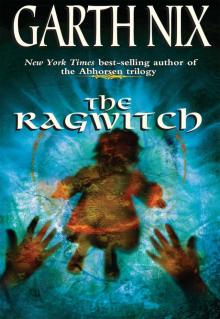 The Ragwitch
The Ragwitch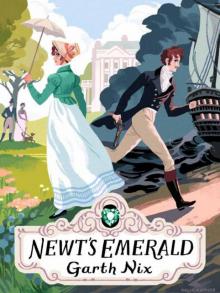 Newt's Emerald
Newt's Emerald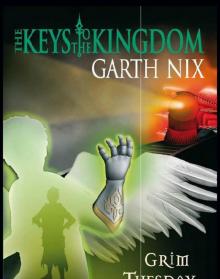 Grim Tuesday
Grim Tuesday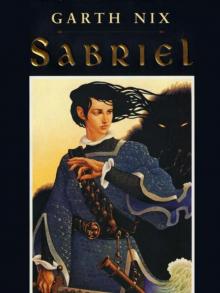 Sabriel
Sabriel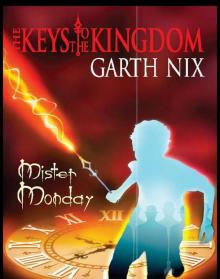 Mister Monday
Mister Monday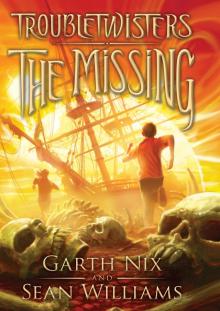 The Missing
The Missing The Fall
The Fall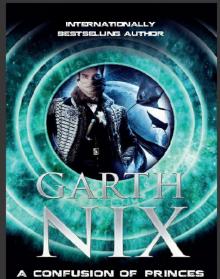 A Confusion of Princes
A Confusion of Princes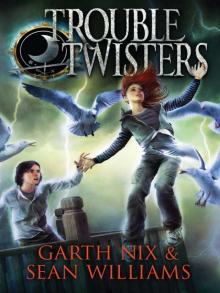 Troubletwisters
Troubletwisters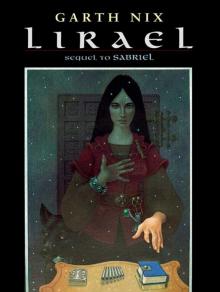 Lirael
Lirael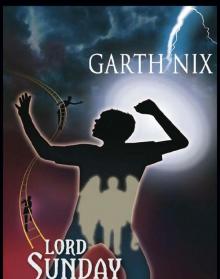 Lord Sunday
Lord Sunday Clariel
Clariel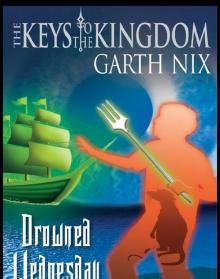 Drowned Wednesday
Drowned Wednesday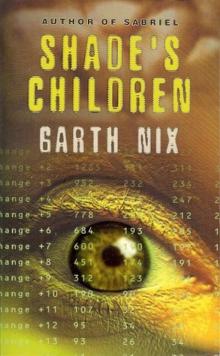 Shade's Children
Shade's Children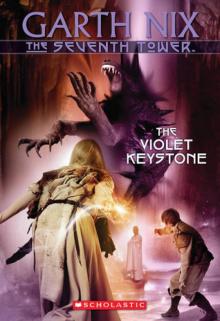 The Violet Keystone
The Violet Keystone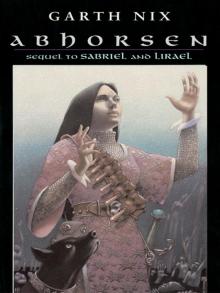 Abhorsen
Abhorsen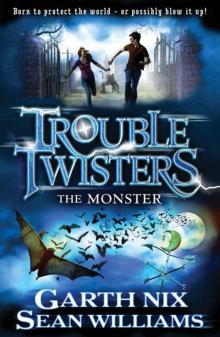 The Monster
The Monster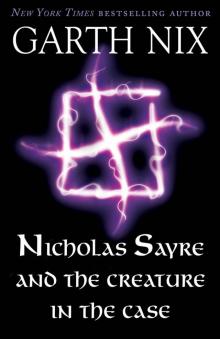 The Creature in the Case
The Creature in the Case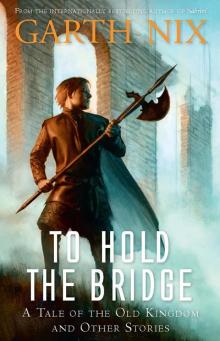 To Hold the Bridge
To Hold the Bridge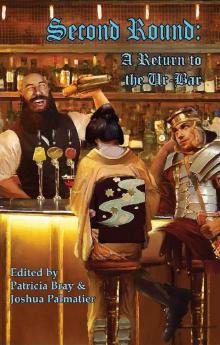 Second Round: A Return to the Ur-Bar
Second Round: A Return to the Ur-Bar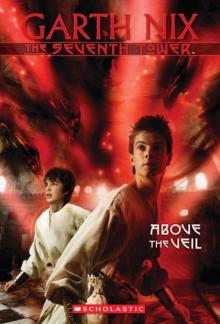 Above the Veil
Above the Veil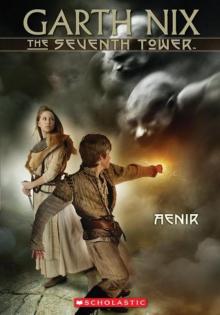 Aenir
Aenir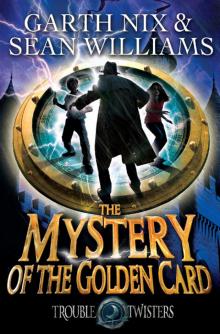 Mystery of the Golden Card
Mystery of the Golden Card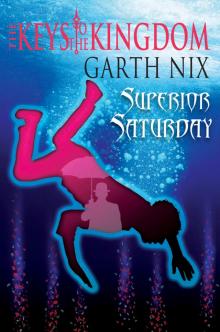 Superior Saturday
Superior Saturday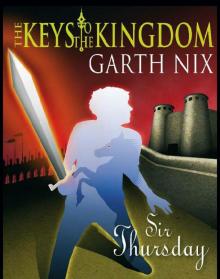 Sir Thursday
Sir Thursday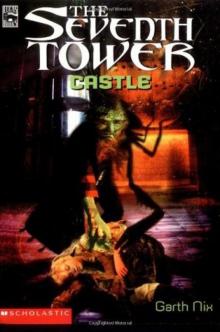 Castle
Castle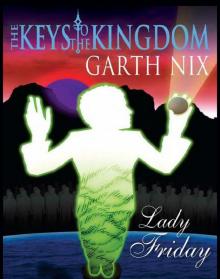 Lady Friday
Lady Friday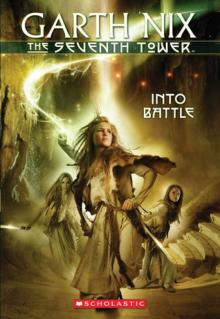 Into Battle
Into Battle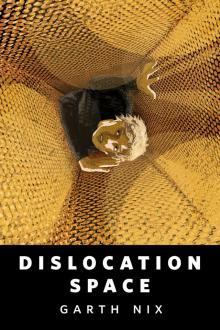 Dislocation Space
Dislocation Space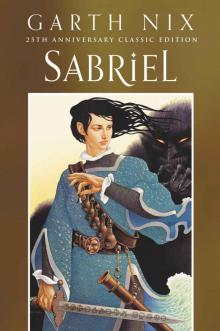 Sabriel (Old Kingdom Book 1)
Sabriel (Old Kingdom Book 1) Sir Hereward and Mister Fitz Go to War Again shamf-1
Sir Hereward and Mister Fitz Go to War Again shamf-1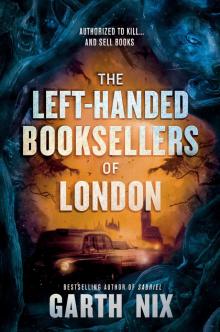 The Left-Handed Booksellers of London
The Left-Handed Booksellers of London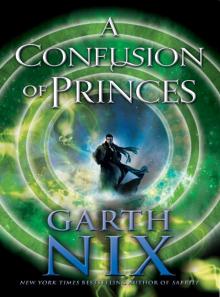 Novel - A Confusion of Princes
Novel - A Confusion of Princes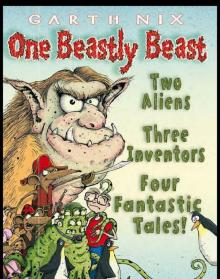 One Beastly Beast
One Beastly Beast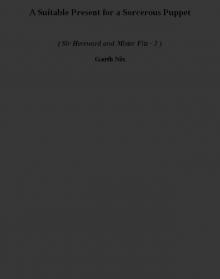 A Suitable Present for a Sorcerous Puppet shamf-3
A Suitable Present for a Sorcerous Puppet shamf-3 Beyond the Sea Gates of the Scholar Pirates of Sarsköe shamf-2
Beyond the Sea Gates of the Scholar Pirates of Sarsköe shamf-2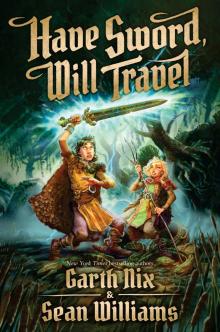 Have Sword, Will Travel
Have Sword, Will Travel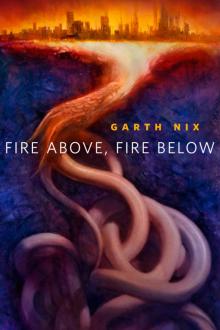 Fire Above, Fire Below
Fire Above, Fire Below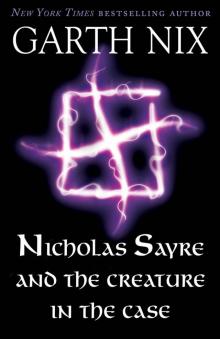 Nicholas Sayre and the Creature in the Case
Nicholas Sayre and the Creature in the Case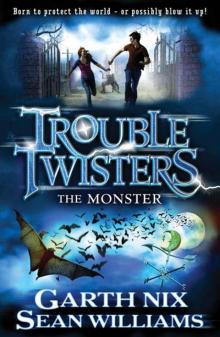 The Monster (Troubletwisters)
The Monster (Troubletwisters)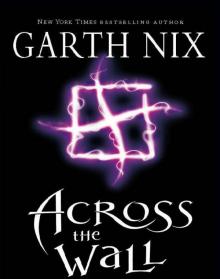 Across the Wall
Across the Wall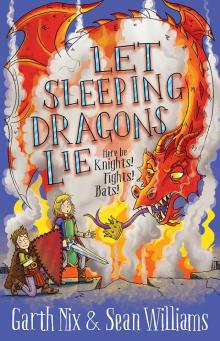 Let Sleeping Dragons Lie
Let Sleeping Dragons Lie![[Abhorsen 03a] - Across the Wall Read online](http://i1.bookreadfree.com/i2/04/12/abhorsen_03a_-_across_the_wall_preview.jpg) [Abhorsen 03a] - Across the Wall
[Abhorsen 03a] - Across the Wall